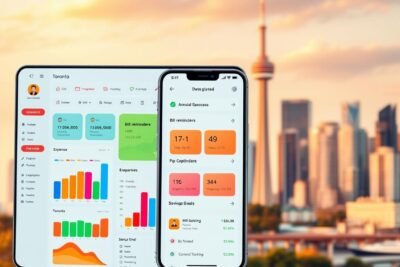
The Ultimate Guide to Budgeting for International Students in the UK

You arrive in a new city with a suitcase and a head full of plans. The first week you discover coffee shops, new friends and the tiny shock of bills. One night, over pizza, you and a flatmate make a simple list of monthly costs and realise a little planning will save a lot of stress.
This guide gives you a clear roadmap. Typical non‑tuition living costs range from about £900–£1,400 per month depending on location, and UKVI maintenance figures are £1,483 per month for London and £1,136 outside London (up to nine months). You’ll learn what things cost, how to shape a realistic budget, and which options suit your course and campus life.
Expect friendly, practical advice on accommodation, food, transport and savings. By the end of the year you’ll have a working budget you can adapt to changing costs and enjoy your student experience without constant worry.
Build strong financial foundations: budgeting, saving, managing debt, credit building, and long-term money strategies.
Explore Finance Guide →- Start here: what you’ll spend and why planning now pays off
- Student visa money basics and the Immigration Health Surcharge
- Accommodation choices and their costs across UK cities
- Food and groceries: shop smart, cook more, spend less
- Transport without the overspend
- Student bank accounts and money tools that work for you
- Earn while you learn: part-time work rules, pay and ideas
- Where is most affordable? Cities that stretch your budget
- Sample student budgets you can copy
- budgeting for international students UK guide: practical ways to save money fast
- Your next steps to a confident, stress-free student budget
Start here: what you’ll spend and why planning now pays off
A clear map of monthly costs turns unexpected bills into planned steps. Begin by listing your main expenses so you can see where each pound goes.
Typical monthly spending sits between £900–£1,400. London often averages £1,300–£1,400 while many other regions fall between £900–£1,300. Key categories are accommodation, food, utilities, transport, study materials and leisure.

- Map main living costs per month accommodation, food, bills, travel and study items to get a quick picture of expenses.
- Start early so you can sequence payments like deposits and first rent and avoid cashflow stress when you move into your new home.
- Compare London versus elsewhere to understand the gap and set sensible per month targets you can actually meet.
- Choose the options that suit your needs catered halls, shared flats or homestays and see how each affects your cost.
"Plan now and you’ll feel in control from day one."
You’ll also learn simple ways to save money quickly: meal planning, travel discounts and sharing household buys with flatmates add up fast. Planning helps with visa paperwork and everyday spending so your budget works in real life, not only on paper.
Student visa money basics and the Immigration Health Surcharge
Before you apply, know the cash you must show and the health charge that buys NHS access.
Immigration Health Surcharge: what you’ll pay and what you get
The immigration health surcharge (IHS) is payable when you apply for student immigration permission. It gives you NHS access for hospital treatment while you study.
Reported figures vary: one source lists about £776 per year (with a three‑year example totalling roughly £2,716 for 3.5 years), and another cites £624 per year. These amounts change, so factor the health surcharge into your upfront costs.
Showing funds for your visa: amounts, 28‑day rule and timing
UKVI maintenance levels usually require £1,483 per month in London and £1,136 per month outside London for up to nine months. That can also be shown as lump sums such as £13,348 (London) or £10,224 (outside).
Funds must be held for 28 consecutive days, and the final day of that period must fall within 31 days before your visa application. Keep balances steady; large, sudden deposits can trigger extra checks.
When you may not need to provide financial evidence
You might not have to show funds if you have been in the UK on a valid visa for 12 months or more, are on certain recognised programmes, or come from a differential evidence list country. Still, prepare bank statements and sponsor letters in case you’re asked.
Moving costs to the UK: what to budget before you arrive
Moving costs vary. Some students bring only essentials and buy most items locally. Others use international removals or couriers charging per box. Plan these costs alongside your first rent and deposits so the money you’ll need is ready when it counts.

"Plan these visa payments and fund checks early to avoid last‑minute stress."
Accommodation choices and their costs across UK cities
Picking the right home shapes both your costs and daily routine. You’ll compare three main options so you can weigh convenience, independence and price.
University halls, private rentals and homestays
University halls often include utilities and Wi‑Fi, and sometimes social or gym facilities. Many undergraduate halls sit between £518–£880 per month, making them an easy first-year choice.
Private rentals give more independence. Outside London expect about £480–£560 per month in shared homes; London private flats can reach £2,300–£2,500 per month.
Homestays usually charge weekly rates roughly £100 a week in London and less elsewhere often including some meals.

What’s usually included and how to pick
Look beyond the headline rent to judge total living costs: proximity to campus, transport links and included bills matter.
- Check what’s included, deposit protection and tenancy length.
- Start in halls to simplify bills and social life, then move to shared private homes later.
- Use your university accommodation team to shortlist safe, good-value places in each city.
"Shared homes can slash your personal share of the bill without losing comfort."
Food and groceries: shop smart, cook more, spend less
Knowing where to shop and how to plan meals turns food into a predictable expense. This section looks at where to buy, what you’ll need and how to keep weekly spend under control.
Budget supermarkets, markets and international stores
Aldi and Lidl give the lowest prices. Tesco, Sainsbury’s, Asda and Morrisons balance price and range. Waitrose and M&S sit at the top end.
Weekly markets can cut costs on fresh fruit and veg. International stores help when you need speciality ingredients at fair prices.
Meal planning on a student budget: weekly spend targets
Most students spend about £150–£250 per month on groceries. Aim for a weekly target that fits that range and track receipts.
- Plan meals and batch cook to use ingredients twice.
- Compare unit prices and use loyalty apps to save money.
- Share staples like oil, spices and cleaning items with flatmates to cut duplicate purchases.
Eating out vs eating in: keeping leisure food costs in check
Eating out usually costs more than cooking at home. Set a weekly cap for treats so your overall expenses stay predictable.
"A couple of well‑planned takeaway nights keep life social without blowing the budget."
Transport without the overspend
Getting around needn't be expensive small choices make a big difference to your monthly travel bill.
You can cut travel costs a lot by picking the right passes and mixing active travel into your week.
Student Oyster, railcards and regional bus passes
Student Oyster gives about 30% off adult Travelcards and Bus & Tram Passes in London. Expect typical monthly spend in the capital to sit between £80–£120.
Outside london, student bus passes often cost £40–£60 per month. Add a railcard for longer trips to save on intercity fares.
Walking or cycling can remove daily fares and boost your health. Many cities run bike-share schemes that work well for short hops.
Plan routes, use lights and helmets, and bundle errands to avoid extra trips.
- Choose weekly or monthly passes to match your schedule.
- Travel off-peak and book in advance for rail savings.
- Combine railcards with split-ticketing sites for cheaper intercity journeys.
- Pick accommodation close to campus to reduce commute time and spend.
"Small changes to how you travel add up fast both in cash and in time."
| Option | Where | Typical per month | Key benefit |
|---|---|---|---|
| Student Oyster | London | £80–£120 | ≈30% off Travelcards and bus passes |
| Regional bus pass | Outside London | £40–£60 | Low monthly cost for daily travel |
| Railcard + split tickets | Nationwide | Varies by trip | Saves on longer journeys |
| Bike-share / walking | Any city | £0–£15 | Lowest cash cost; supports health |
Student bank accounts and money tools that work for you
A good student account makes paying rent, receiving wages and proving funds much simpler.
Opening a UK account: You’ll usually need a passport and a university confirmation letter showing your UK and home addresses. Expect checks and a 4–5 week setup time, so plan cash flow and hold emergency savings before you arrive.
Transfers and fees: Compare international transfer and currency conversion fees. Many accounts are fee‑free; you rarely need a paid premium plan unless you use extras. Overdrafts are handy but costly if misused treat them as short‑term credit, not free money.
Build a simple money toolkit: track a student budget per month, use one app to monitor spending and split shared bills fairly with flatmates. For app suggestions see the best budgeting apps.
- Prepare documents early to avoid delays.
- Choose low‑fee transfers and avoid double conversion charges.
- Know overdraft limits and penalty costs to dodge surprise charges.
"A clear bank setup removes admin friction and keeps your expenses predictable."
Earn while you learn: part-time work rules, pay and ideas
A steady part‑time role can top up your rent and teach workplace skills you'll use after graduation.
Visa limits: You can usually work up to 20 hours per week during term time and full‑time in holidays. Keep this rule in mind when you schedule shifts so your studies stay first.
Pay and earnings: Typical hourly pay sits around £13.11–£13.83. Working a few shifts a week can add a helpful sum per month while you study and reduce pressure on savings.
Where to find roles fast
Check your university careers portal, Students’ Union boards and campus job listings first. Local cafes, shops and hospitality also hire regularly.
CV-friendly jobs and tips
On‑campus roles such as library assistant, lab technician or research support build course‑related experience and fit timetables. Customer service, tutoring and student ambassador jobs boost transferable skills.
- Plan shifts around lectures and deadlines to protect grades.
- Save a portion of term earnings for larger costs later in the year.
- Remember the Employment (Allocation of Tips) Act you keep 100% of tips you earn.
"Balancing work and study gives you cash now and confidence for the future."
Where is most affordable? Cities that stretch your budget
Picking the right city can stretch your money and keep campus life lively. Below is a quick look at four places where living costs tend to be kinder to your pocket outside London.
Belfast, Derby, Glasgow and Leicester at a glance
- Belfast often tops value lists. Consumer prices including rent run about 43.1% lower than London. A typical recommended annual budget sits around £5,500–£7,500, which equals roughly £458–£625 per month for many students.
- Derby attracts international cohorts seeking lower costs without losing university facilities. Typical living costs sit near £1,038–£1,282 per month, making it a sensible mid‑range option.
- Glasgow balances a big‑city feel with good-value accommodation. Expect living costs around £800–£1,000 per month and plenty of student housing choices close to campus.
- Leicester gives broad flexibility. Accommodation ranges from about £350–£1,000 per month and transport is typically near £90 per month, so you can pick a neighbourhood and price point that fit your plan.
- Quick comparison: Belfast = best value; Derby = mid range; Glasgow = affordable city life; Leicester = flexible options.
- Check your university accommodation team and Students’ Union pages for city‑specific housing lists, travel passes and student offers.
"Choosing the right city often cuts your living costs while keeping study life rich."
Sample student budgets you can copy
See two clear sample budgets that show how city choice changes what you pay each month.
Outside London: a realistic £1,000 per month breakdown
Typical monthly plan (~£1,000 per month) shared accommodation £500; food £200; transport £50; utilities & internet £100; leisure/misc £150.
This plan keeps essentials steady while leaving a small entertainment cap so you can socialise without worry.
Tips: share bulk groceries, split bills with flatmates and use regional bus passes to keep transport costs low.
In London: adjusting the same plan for higher living costs
To adapt the outside-London plan, up your rent line to reflect private rentals (£2,300–£2,500 if alone) or choose shared rooms to cut that sharply.
Transport in the capital often rises to £80–£120 per month with a Student Oyster. Keep food at £150–£250 per month and hold utilities steady.
Plan for one-off annual charges: visa fee (~£490) and the immigration health surcharge (reported at about £776 or £624 a year in different sources) when you map the year’s costs.
- Trim costs by living slightly further out and cycling when you can.
- Work a few campus hours and keep grocery targets realistic to lower overall expenses.
- Track each line monthly and update the plan if rent or bills change to keep your student budget accurate all year.
budgeting for international students UK guide: practical ways to save money fast
Smart swaps at home and smart use of student deals will boost your disposable income.
Share housing and essentials to lower big costs
Share your home to cut the largest bills first. Splitting rent and utilities halves those lines for many people.
Pool pantry basics, cleaning products and bulk buys with flatmates to avoid duplicate purchases. This lowers the cost of living and keeps your kitchen stocked.
Stack student discounts: ISIC, TOTUM, UNiDAYS and Student Beans
ISIC links you to thousands of discounts worldwide. In the UK, TOTUM, UNiDAYS and Student Beans add local deals on food, travel, stores and entertainment.
Use more than one hub. Stacking these student discounts can mean a single meal, ticket or shop run is cheaper than you expect.
Buy in bulk, subscribe smartly and track every pound
Buying in bulk at markets or supermarkets beats pay-as-you-go for staples you actually use. Avoid waste by planning meals and sharing jars and tins.
Choose subscriptions only when you use them often. Save by rotating cheaper brands and using loyalty cards at regular stores.
| Strategy | How it saves | When to use |
|---|---|---|
| Share accommodation | Splits rent and utilities | Always—biggest immediate cost cut |
| Stack student discounts | Lower food, travel and entertainment bills | Use before purchases; check multiple apps |
| Bulk buys & markets | Lower unit price; fresher produce | When staples are used weekly |
| Smart subscriptions | Save vs one‑off buys if used often | Choose monthly or annual based on use |
- Split rent, utilities and pantry items at home this week.
- Sign up to ISIC plus two UK hubs (TOTUM, UNiDAYS, Student Beans) and check offers.
- Plan two bulk shops and use markets for fresh veg.
- Set a small entertainment allowance and track every pound in a simple app or spreadsheet.
"Small, consistent changes turn pockets of spending into real monthly savings."
Your next steps to a confident, stress-free student budget
A short, focused checklist will move your money plan from idea to working routine.
Start by checking UKVI maintenance levels: London £1,483 per month; outside London £1,136 per month, held for up to nine months. Set up a UK bank account early you will need your passport and a university letter to speed the process.
Lock in essentials: confirm accommodation, map fixed bills and set per month targets that match your course needs and transport patterns. Line up funds, plan the immigration health surcharge (reported at about £776 or £624 a year) and spread one‑off costs across the months to avoid pressure.
Road‑test the plan in weeks 1–4, tweak quickly and ask university support for banking letters, budgeting workshops and local transport advice. Pick two tools you trust, build a 90‑day runway and note two cities you might consider later in the year.
Master Your Money in 2026
Learn budgeting, banking, credit building, savings, and investing with expert guides designed for students and young professionals.






Leave a Reply